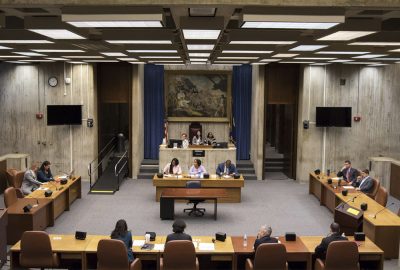
The Boston City Council voted on April 3 to declare its support for a bill in the Massachusetts Legislature that seeks to reform the state’s healthcare system. The changes aim to lower healthcare prices and expand coverage by extending Medicare to all Commonwealth residents.
Councilors voted unanimously to adopt a resolution supporting the bill, S.683, which was proposed in the state Senate. If passed, the bill would restructure the state’s health industry by establishing the Massachusetts Health Care Trust, which would consolidate all healthcare plans into a single-payer healthcare system, according to the bill.
District 6 City Councilor Matt O’Malley, who offered the resolution declaring the council’s support for S.683 along with District 8 City Councilor Josh Zakim, said in the Council meeting that while Massachusetts and Boston have often led the push for healthcare justice, the city and state governments needed to reduce healthcare fees.
“Despite the advances we made, losing the public option — the Affordable Care Act — was one of the great tragedies of the last decade,” O’Malley said in the meeting. “While the vast majority of Massachusetts residents have health insurance, health care costs continue to rise unsustainably.”
Zakim said at the meeting it was important for the Council to support S.683, as the current healthcare system did not adequately serve the people of Massachusetts.
“We heard about some of the gaps in coverage, in care, in resources for people,” Zakim said in the meeting. “And I think if we look over data over and over again from across the state and even across the country, we see a need for reform like this.”
A press release on the City Council’s resolution details that recent reports indicated there are currently 20,000 uninsured children living in Massachusetts.
“Establishing a single-payer health care system would allow doctors and patients to make healthcare decisions primarily based on the needs of the patients and also allows patients to access doctors and hospitals without paying premiums or co-pays,” the press release stated.
Dr. Andrea Christopher, a general internal medicine fellow at Harvard Medical School, wrote in a HMS blog that a single-payer healthcare system would replace the “impressively complicated network” of insurance plans by establishing a government agency to consolidate into one plan.
“Rather than multiple competing health insurance companies, a single public or quasi-public agency takes responsibility for financing healthcare for all residents,” Christopher wrote. “That is, everyone has health insurance under a one health insurance plan, and has access to necessary services.”
However, Christopher wrote the single-payer healthcare system would be similar to Medicare in that individuals would still be able to choose where they receive care, hence the “Medicare-for-all” nickname.
O’Malley said in the meeting while single-payer healthcare is often labeled as a “left-wing issue,” his experience as a City Councilor has shown that this proposal also has a “conservative dimension” as the current system harms small business owners the most.
“The Bostonian most negatively affected by our profit-driven health care system are our small business owners and entrepreneurs,” O’Malley said. “When private healthcare is so much more expensive than Medicare and Medicaid, small businesses that don’t have that bargaining power of many employees will often pay the price.”
Dylan Cochran, 23, of Brighton, said he approves of lowering the prices of state healthcare costs.
“I feel like if elected officials are responsible for what’s happening for prices in health care, it’s good, they have more incentive to serve the people than private companies do,” Cochran said. “So in terms of price, for sure I believe that a government-organized health program would be way more cost effective to most people.”
Elizabeth Torres, 27, of Allston, said while she thinks the objectives of the healthcare reforms are good, she was concerned about how the process would be structured and how it would affect the healthcare market.
“It would really depend on if income taxes would be a part of that or how it would be paid for,” Torres said. “There are a lot of ways to allocate that. In addition, I think there’s some question about how quickly it would be implemented because it could possibly destabilize an entire market that is one of the largest markets in Massachusetts.”
Berklee College of Music student Ryan McSweeney, 19, of Jamaica Plain, said he thinks the healthcare reforms seem like a good idea and can be beneficial for people of lower income.
“It sounds great,” McSweeney said, “especially for people who are in need of medical insurance or health care that can’t afford it or if they don’t have good coverage.”


















































































































